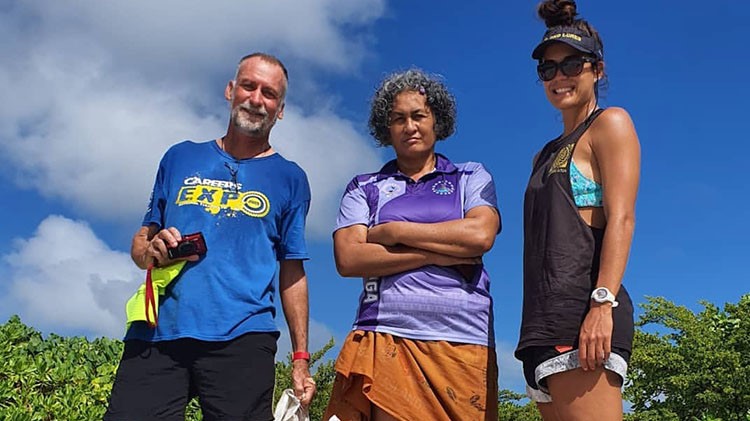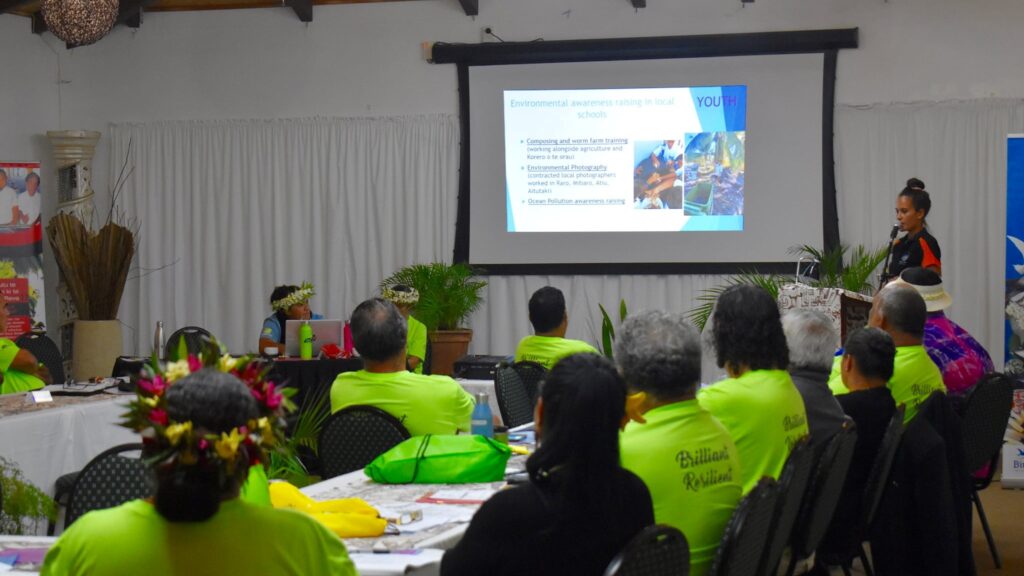The importance of non-government organisations
Saturday 25 June 2022 | Written by Te Ipukarea Society | Published in Opinion

Kelvin Passfield, Ana Tiraa and Alanna Smith cleaning plastic from the beach in Aitutaki. Photo: Supplied/21062515
A non-government organisation, also referred to as an NGO is an organisation that operates independently from the government, working to promote the well-being of everyone in the community and promoting citizen participation.
At its core, an NGO aims to serve the public interest and is created by those who have similar interests.
Te Ipukarea Society (TIS) is an environmental NGO, which was established in the Cook Islands in 1996. TIS is committed to environmental sustainability and conservation focusing on key project areas which include working closely with youth, waste management, biodiversity, ecologically sustainable development and climate change initiatives.
Facilitating community meetings is one way that NGOs like TIS work to inform the public about the environment and everything that is around them. TIS works closely with students through a variety of environmental programmes. Some of these programmes have been carried out in the form of school presentations, holiday programmes, and workshops. Presentations provide an excellent opportunity for students to learn more about subjects relating to the environment and play an important role in shaping their curious minds. Holiday programmes and workshops are a great way to get students outdoors to enjoy nature and to see things that they otherwise do not see or are not aware of.
A Learning By Doing environmental photography programme was delivered to schools here in Rarotonga and to four of the southern group islands in the Cook Islands. The programme successfully educated students on capturing the environment, how to use a DSLR camera to capture what the environment means to the students and presenting their final prints at an art exhibition. This was a very rewarding experience for those students who participated and a programme that was very well received by the schools and the community. Students were able to have discussions with their peers about the programme and take home their art pieces.

Another unique programme that was successfully carried out in Rarotonga and the Pa Enua was the Maine Mura programme which focuses on Te Ipukarea Societies’ key area of waste management and promoting ecologically safe sanitary products for Cook Islands women in an effort to reduce the amount of disposable waste entering the landfill. Maine Mura was carried out to schools in Rarotonga and the outer islands with the chance to talk to the students about alternative reusable feminine hygiene products which included moon cups, reusable pad kits and period undies. Following the presentations, TIS were able to distribute reusable pad kits for the students to trial. This project has not only gained a lot of interest from students but women in the community have expressed interest in purchasing the reusable products as they are not only better for the environment but it is a more affordable alternative for women to consider using during their menstrual cycle.
Rat eradication and seabird surveys on our national park ‘Suwarrow’, regionally known as an important breeding atoll are some of Te Ipukarea Societies' ongoing projects focusing on invasive species in an effort to remove rats that threaten the native seabirds. Through generous donations locally and internationally, TIS staff Alanna Smith and Kelvin Passfield were able to sail up to Suwarrow on the traditional vaka Marumaru Atua to lay out rat bait to get rid of the remaining rat population. We have been able to stay up to date with the rat eradication programme thanks to the amazing efforts of the Cook Islands Voyaging Society (CIVS). We are looking forward to hearing about their journey and the current situation of rats when they return.
Through these programmes, TIS has been able to collaborate with other local NGOs and this has only continued to build partnerships with others in the community by promoting the well-being of everyone, improving community understanding of specific areas of concern, sharing valuable knowledge, and developing new ideas.
There are lots of ways that you can show support to local NGOs in Rarotonga and it can be as simple as contacting them and asking if there are any opportunities to help. Be the change that you wish to see in the world.














































